The Eleventh Doctor and Other Fairy Tales
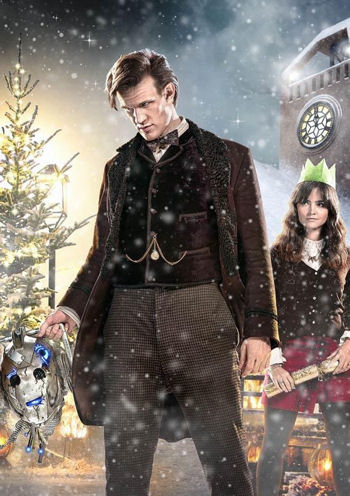 You never forget your first Doctor. In his final episode, Matt Smith's 11th Doctor paid homage to that thought. Wistfully he told Clara he would always remember the time when he was the Doctor, but all things have to come to an end. Else how would anything else have a beginning? You never forget your first Doctor. In his final episode, Matt Smith's 11th Doctor paid homage to that thought. Wistfully he told Clara he would always remember the time when he was the Doctor, but all things have to come to an end. Else how would anything else have a beginning?
My first Doctor, technically, was Jon Pertwee, but I only saw a couple of episodes and then did not come back around until Tom Baker. But I am not here to talk about them; I became a real fan during the revival in 2005. Even then, this is about the thing that people forget about with a show that has lasted this long -- the passing on of fandom to the next generation.
So despite digging Christopher Eccleston and thinking David Tennant was great and then really resisting Matt Smith until he won me over, Smith is my Doctor because he is my son's Doctor.
My daughter loves Tennant, but she comes at her self-admitted Whovian status from a teenager's point of view. My son became a Whovian at that perfect target age -- and too often in our adult fandom we forget this -- as a child.
As a child, my son fell in love with the Doctor as a hero who was funny, brave, smart and always trying to do the right thing. Summed up nicely in "The Day of the Doctor," he is "...never cruel or cowardly." Pretty simple definition of what we should all aspire to be when we are young enough to remember to have aspirations.
Much has been made about how show runner Steven Moffatt used Matt Smith's Doctor to take more of a fairy tale approach. Tennant's Doctor may have brought in the teens, but Smith's Doctor brought in the children, this funny old man in a young man's body who from the very beginning and to the very end -- whether you noticed or not -- was about comforting children in their fears, and helping them confront and defeat them.
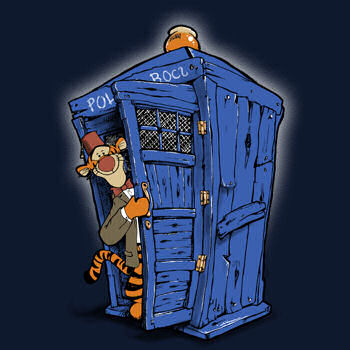 He first appeared in the backyward of eight-year-old Amelia Pond, bouncing around like Tigger and pretty much repeating that character's first appearance -- compare "Tiggers do NOT like hunny" to "Beans are poison!" before settling on fish fingers and custard, a combination that is exactly something a child would come up with to disturb adults for her own titillation. He first appeared in the backyward of eight-year-old Amelia Pond, bouncing around like Tigger and pretty much repeating that character's first appearance -- compare "Tiggers do NOT like hunny" to "Beans are poison!" before settling on fish fingers and custard, a combination that is exactly something a child would come up with to disturb adults for her own titillation.
In that first episode, "The Eleventh Hour," the Doctor protects us all from Prisoner Zero, who, like many of Moffatt's foes, appears naggingly juuuuust in the corner of your eye. (Yet my son, who loves snakes, found Prisoner Zero "cute".) And it all starts with a crack in the wall, a pretty common childhood fear.
He sweeps away with the now-grown Amy (just like Peter Pan and Wendy) to be distracted by the sound of a child crying in "The Beast Below." While many of his adventures deal with more adult themes, the show keeps coming back to that -- the Doctor protects children above all others.
Though we see Amy go through adulthood, marriage and even in a weird way motherhood, she always has that protector in the Raggedy Doctor. And the show often returned to that image of the little girl she was, because in a way that is always who she will be to the Doctor: Amelia Pond, the Girl Who Waited.
Huh. Just like a parent, and yet unlike a parent, because the Doctor can return to that time when he needs to.
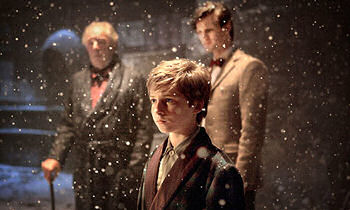 The first episode my son watched was in the midst of that, with "A Christmas Carol." What gives the Doctor hope in Sardick? That he almost hit a child, but could not bring himself to do it. Thus the Doctor can tend to the wounded child in Sardick and save hundreds of lives to boot. The first episode my son watched was in the midst of that, with "A Christmas Carol." What gives the Doctor hope in Sardick? That he almost hit a child, but could not bring himself to do it. Thus the Doctor can tend to the wounded child in Sardick and save hundreds of lives to boot.
My son next watched "The Curse of the Black Spot," which restores a son to his father, now roaming another dimension having, we'll assume, wonderful pirate adventures.
And then "The Doctor, the Widow and the Wardrobe," with all its obvious associations and again, the Doctor serving to give a family stability (after a lot of screw-ups).
With his next companion, while mourning the loss of the Ponds, he finds the Impossible Girl, Clara Oswald. (Two in a row given epithets that sound like fairy tales in themselves.) My son, not yet over his fear of the Daleks, skipped "The Asylum of the Daleks," and instead we resumed with "The Snowmen."
And there you have Clara as the companion this Doctor needs because she, too, protects children. We meet her 19th century self as a Governess, and then serving the same purpose in the 21st century. (This culminates with her directly taking care of all the child-like Doctor's incarnations in "The Name of the Doctor.")
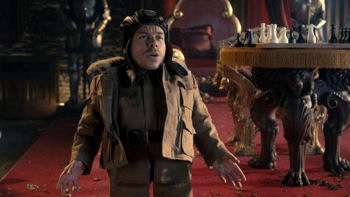 For the first time since Adric, perhaps, the Doctor sort of takes on children as companions thanks to Clara, when her charges join them for "Nightmare in Silver." For the first time since Adric, perhaps, the Doctor sort of takes on children as companions thanks to Clara, when her charges join them for "Nightmare in Silver."
In itself, that adventure confronts more child-like concerns, the ultimate Scooby Doo adventure in which an abandoned amusement park/planet betrays its dark secrets. Except the museum curator turns out to actually be the King -- right out of a fairy tale. (And proof that Neil Gaiman is the perfect writer for Moffatt's vision of the Doctor, because who else agrees so strongly that we are just stories, after all. The trick is to make them good ones.)
By this time, my son started Netflixing back to the Tenth Doctor with his sister, and he has not yet made it all the way throught the saga of the Ponds. But the dual influence led to his desire for the greatest Christmas gift ever -- forget the Red Ryder BB Gun; he wanted a sonic screwdriver. Oh, and a stuffed Adipose, which he at first hoped I could just sew for him.
No, I don't sew.
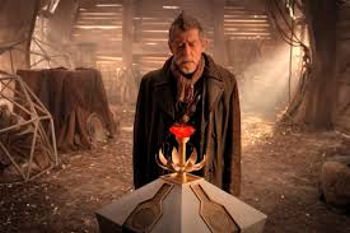 We caught up last month with "The Day of the Doctor," and because I'd been recently going back to the beginning with my son, I noticed the children recurring. The key tragedy for John Hurt's War Doctor, and the pain reflected in the Eleventh's eyes, was the number of children who would be killed in ending the Time War. The Doctors had failed to protect the children of Gallifrey in a catastrophic way. We caught up last month with "The Day of the Doctor," and because I'd been recently going back to the beginning with my son, I noticed the children recurring. The key tragedy for John Hurt's War Doctor, and the pain reflected in the Eleventh's eyes, was the number of children who would be killed in ending the Time War. The Doctors had failed to protect the children of Gallifrey in a catastrophic way.
Of course Moffatt found a way out of it, but not before an exasperated War Doctor, not yet confronting that sin, out and out called the Eleventh a child. Yet that "child" helped the War Doctor prevent that loss, and the Eleventh Doctor was renewed without being regenerated.
So as Matt Smith left the role (too soon, I cry out, but hey, it's not MY decision), Moffatt pulled out the stops for this protector of children. The Eleventh Doctor, whether you agree with the circumstances, whether in or out of character, becomes the ultimate symbol of childhood: Santa Claus.
He stays in a town called Christmas, making toys and becoming a legend to the children. After first encountering adults who explain the "truth field" (he'll know if you've been bad or good, because you'll tell him, for goodness' sake), most of the Doctor's interactions with the townspeople are the children.
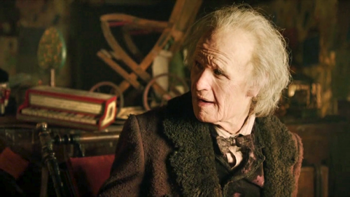 Why does he age over the 300 years in Christmas? So Moffatt can return him to the state that children met him 50 years ago in reality: the quirky old man, the kindly grandfather to generations of children. Why does he age over the 300 years in Christmas? So Moffatt can return him to the state that children met him 50 years ago in reality: the quirky old man, the kindly grandfather to generations of children.
It may not have a scientific explanation or match up when clearly the Eleventh had another 300 or so years without aging a day, but for the purposes of the meaning of the story, he had to age.
Moffatt took us to two full circles, if you will. Back to Hartnell spiritually, and then as those Doctors' incarnations came to an end, back to the beginning of Smith's run. The now young Eleventh/Twelfth/Thirteenth (a re-set so the next one can happen) sees young Amelia Pond and receives absolution from the forever lost Amy, if only in his mind.
He fought for the children. He fought to change the future. Never cruel and never cowardly.
As I write this, my son hasn't watched it yet. I'm not eager to bring the Eleventh Doctor to a close for him, even though obviously it will happen. I've re-experienced several episodes through his eyes, and thought that Moffatt achieved what he really wanted to do all along, make the Doctor a hero for children.
It's where cinematically Warner has failed us with both Batman and Superman. That "S" is supposed to be for hope, but nowhere in Man of Steel does Superman ever truly offer us any. And though on television Batman remembers the children, it only gets a brief nod in Batman Begins (and that kid grew up to be King Joffrey so... ick.)
But back to the Doctor, who offers hope. And courage. And intellect. And cleverness.
The loss of David Tennant was sad but okay for me because it was just me watching it, and no, I don't think Russell T. Davies was creating a children's show. The Tenth Doctor often emphasized that there was a logical explanation for everything, even when facing the Devil. (Notice, too, that the Tenth is an atheist, but "The Time of the Doctor" makes claims for an afterlife, though maybe not for Timelords.)
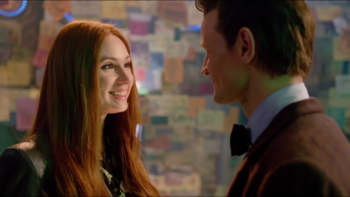 All things come to an end. The Eleventh Doctor said so. And that's what makes his absolution from Amy so perfect -- childhood ends, but Amy turned out okay. Clara will transition to the next Doctor because she was already taking care of him. All things come to an end. The Eleventh Doctor said so. And that's what makes his absolution from Amy so perfect -- childhood ends, but Amy turned out okay. Clara will transition to the next Doctor because she was already taking care of him.
I'm sad to show my nine year old son "The Time of the Doctor" because I'm sad for that impending childhood's end.
I know that like Amy to the Eleventh, my son will probably pat my hand and tell me that it's okay. Because it has to be, and we'll move on to the next Doctor, and the next stage of our lives.
But I will always remember the time when Matt Smith was the Doctor.
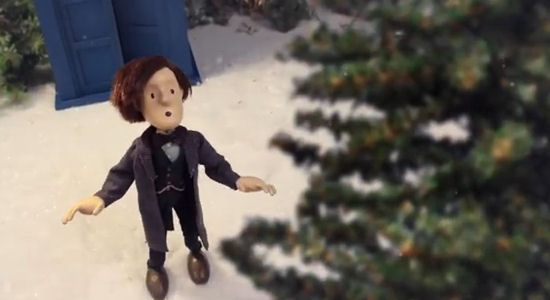
|
 You never forget your first Doctor. In his final episode, Matt Smith's 11th Doctor paid homage to that thought. Wistfully he told Clara he would always remember the time when he was the Doctor, but all things have to come to an end. Else how would anything else have a beginning?
You never forget your first Doctor. In his final episode, Matt Smith's 11th Doctor paid homage to that thought. Wistfully he told Clara he would always remember the time when he was the Doctor, but all things have to come to an end. Else how would anything else have a beginning? He first appeared in the backyward of eight-year-old Amelia Pond, bouncing around like Tigger and pretty much repeating that character's first appearance -- compare "Tiggers do NOT like hunny" to "Beans are poison!" before settling on fish fingers and custard, a combination that is exactly something a child would come up with to disturb adults for her own titillation.
He first appeared in the backyward of eight-year-old Amelia Pond, bouncing around like Tigger and pretty much repeating that character's first appearance -- compare "Tiggers do NOT like hunny" to "Beans are poison!" before settling on fish fingers and custard, a combination that is exactly something a child would come up with to disturb adults for her own titillation. The first episode my son watched was in the midst of that, with "
The first episode my son watched was in the midst of that, with " For the first time since Adric, perhaps, the Doctor sort of takes on children as companions thanks to Clara, when her charges join them for "
For the first time since Adric, perhaps, the Doctor sort of takes on children as companions thanks to Clara, when her charges join them for " We caught up last month with "The Day of the Doctor," and because I'd been recently going back to the beginning with my son, I noticed the children recurring. The key tragedy for John Hurt's War Doctor, and the pain reflected in the Eleventh's eyes, was the number of children who would be killed in ending the Time War. The Doctors had failed to protect the children of Gallifrey in a catastrophic way.
We caught up last month with "The Day of the Doctor," and because I'd been recently going back to the beginning with my son, I noticed the children recurring. The key tragedy for John Hurt's War Doctor, and the pain reflected in the Eleventh's eyes, was the number of children who would be killed in ending the Time War. The Doctors had failed to protect the children of Gallifrey in a catastrophic way. Why does he age over the 300 years in Christmas? So Moffatt can return him to the state that children met him 50 years ago in reality: the quirky old man, the kindly grandfather to generations of children.
Why does he age over the 300 years in Christmas? So Moffatt can return him to the state that children met him 50 years ago in reality: the quirky old man, the kindly grandfather to generations of children.  All things come to an end. The Eleventh Doctor said so. And that's what makes his absolution from Amy so perfect -- childhood ends, but Amy turned out okay. Clara will transition to the next Doctor because she was already taking care of him.
All things come to an end. The Eleventh Doctor said so. And that's what makes his absolution from Amy so perfect -- childhood ends, but Amy turned out okay. Clara will transition to the next Doctor because she was already taking care of him. 





